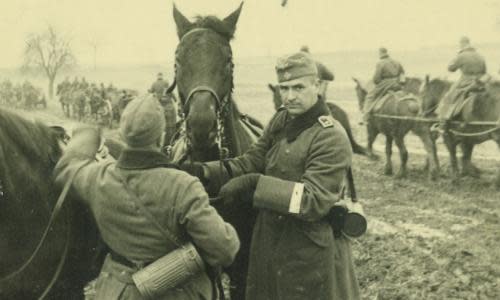The SS Officer's Armchair by Daniel Lee review – the life of an 'ordinary Nazi'

In 2011, having just completed research on the experiences of Jews in Vichy France, Daniel Lee met a Dutch student who told him a remarkable story. Her mother had taken a chair to be reupholstered in Amsterdam. When she returned to collect it, the man angrily told her that he did not work for Nazis or their families. He then presented her with a bundle of old documents covered in swastikas that he had found sewn into the chair’s cushion. She was astonished and had no idea how the documents came to be there. Born in Czechoslovakia, she had bought the chair while studying in Prague in 1968.
Both the mother and the daughter were keen to know more about the mysterious man whose documents were hidden inside their chair and Lee agreed to take a look. They turned out to belong to Robert Griesinger, a German lawyer who was sent to Nazi-occupied Prague in 1943 as a senior civil servant. His passport photo showed a handsome man “with slicked-back hair and a strong, distinctive face”. He had a scar on his left cheek which, as Lee later discovered, dated from his time in a rightwing student duelling fraternity in Tübingen. Ranging from 1933 to 1945, the documents included his proof of identity and profession. But why had he hidden them in the chair?
In search of an answer Lee went first to Prague, where he discovered that Griesinger was an Obersturmführer in “one of the last century’s most sinister organisations”, the SS. In Berlin he found his “immense” SS file. It was packed with letters, reports and even family trees compiled for Griesinger and his wife, Gisela, to prove their Aryan descent: “I felt the sheer irony,” Lee writes, “of this SS officer’s most precious documents ending up in the possession of a British Jew.”
Related: Nazis on retreat: the SS holiday camp near Auschwitz – in pictures
Griesinger joined the SS in 1933, partly to further his career. As a young lawyer in his home city of Stuttgart he worked for Württemberg’s political police in the building used by the Gestapo to torture suspects. In this memorable and chilling book, Lee tells the story of an ordinary Nazi, one of the thousands of faceless bureaucrats and administrators who kept the Third Reich running efficiently and enabled “the famous fanatics and murderers” to perpetrate the horrors of the Holocaust.
In Prague, Griesinger worked at the ministry of economy and labour. He played a key role in the deployment of Jewish forced labour, including authorising the transfer of workers from mines or brickyards to Theresienstadt concentration camp. Praised by his superiors as a “good and loyal worker”, it is a role that earned him, Lee writes, “the status of a Holocaust perpetrator”.
At the end of the war, Lee suggests Griesinger himself may have been sent to Theresienstadt, as it became an internment camp for Germans. With his incriminating Nazi documents safely concealed in the chair, he hoped to escape retribution and rejoin his family. But he contracted dysentery and ended up in a Prague hospital where he died on 27 September 1945, either from the illness or at the hands of Soviet soldiers.
Lee’s own family was devastated by Nazi violence. When he first met Griesinger’s two daughters, Jutta (born 1937) and Barbara (born 1939), he thought they should “make amends for his actions by bearing witness” and acknowledging the evidence of their father’s complicity in Nazi crimes. But they knew scarcely anything about their father (“an unspoken memory”) and they were eager to hear what Lee had discovered about Griesinger in his research. He came to like them, and even saw parallels with how his own family had dealt with their experiences: “The traumas of the war were wrapped in an oppressive silence that became habitual over the course of generations.”
According to the author, “no book has ever been written on a low-ranking, regular SS officer”. As well as a brilliant researcher, Lee proves himself to be an insightful narrator – of both the life of a Nazi “desk murderer”, and the continuing attempts of Griesinger’s family to come to terms with the long shadow his role as an SS officer has cast over their lives.
• The SS Officer’s Armchair: In Search of a Hidden Life is published by Jonathan Cape (£20). To order a copy go to guardianbookshop.com. Delivery charges may apply.

